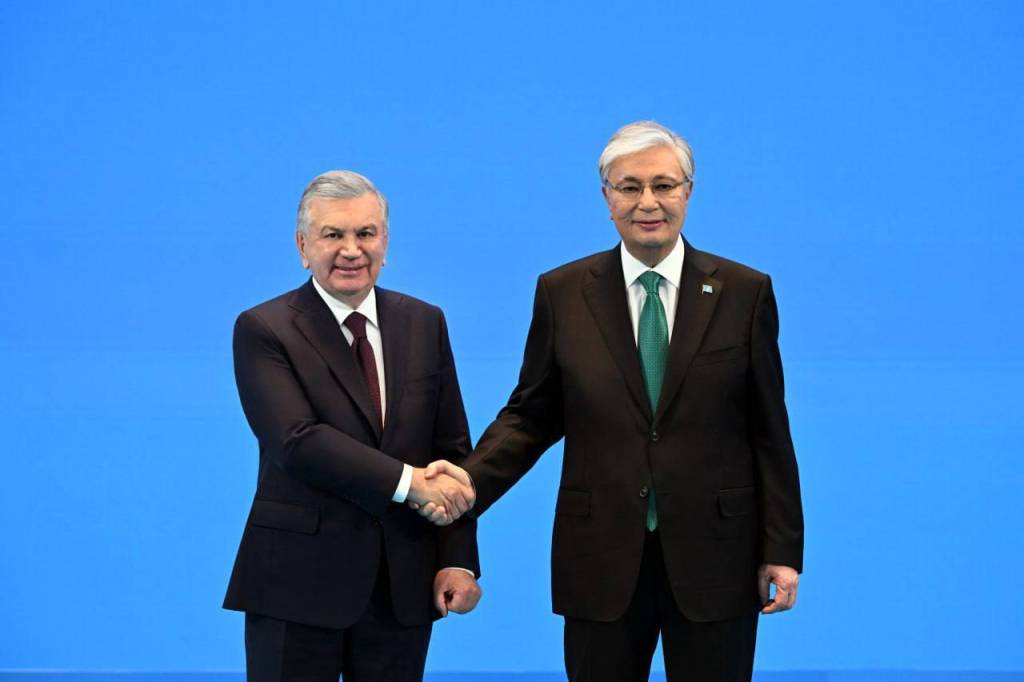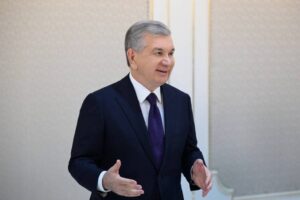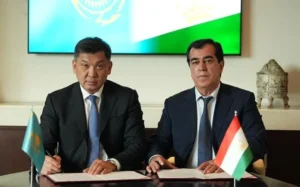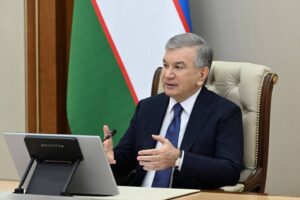Uzbek President Calls for Deeper Regional Integration and Strategic Cooperation at Central Asia–China Summit in Astana

Astana, The Gulf Observer: President of the Republic of Uzbekistan, Shavkat Mirziyoyev, participated in the second “Central Asia – China” Summit held in Astana, Kazakhstan. The summit was chaired by President Kassym-Jomart Tokayev and attended by President of the People’s Republic of China Xi Jinping, President of the Kyrgyz Republic Sadyr Japarov, President of the Republic of Tajikistan Emomali Rahmon, and President of Turkmenistan Serdar Berdimuhamedov.
The high-level meeting focused on enhancing multifaceted cooperation between Central Asian nations and China, while also addressing pressing global and regional developments.
In his address, President Mirziyoyev commended President Xi Jinping’s pivotal role in advancing friendship and strategic partnerships with Central Asian countries and supporting sustainable development through practical initiatives under the Belt and Road framework. He acknowledged the significant progress achieved since the inaugural summit in Xi’an in 2023, including the establishment of a permanent Secretariat and institutional mechanisms for cooperation.
The Uzbek leader emphasized the growth in trade between Central Asia and China, projecting the volume to reach $100 billion this year. He identified two driving forces behind the deepening partnership: the internal transformation and cooperation climate in Central Asia, and China’s consistent engagement in fostering regional ties.
President Mirziyoyev expressed concern over the deteriorating global geopolitical landscape and called for resolving international disputes exclusively through diplomacy, respect for sovereignty, international law, and the UN Charter. In this regard, he welcomed the adoption of the Treaty on Eternal Good-Neighborliness, Friendship, and Cooperation as a step toward lasting regional peace and proposed a Concept for Long-Term Partnership with actionable projects and mechanisms.
Highlighting the strategic importance of trade and technological cooperation with China, he proposed the development of a Common Space of Great Opportunities supported by knowledge and technology exchanges. He suggested launching a New Economic Partnership Program and establishing an Interregional Council on Trade and Investment, with Uzbekistan offering to host its inaugural meeting.
To strengthen trade relations, the President proposed a multilateral platform under the Digital Belt and Road initiative named the Electronic Silk Road. He also called for the establishment of a Regional Center for Industrial Standardization and Certification in Tashkent, along with a technology transfer roadmap involving research institutions and enterprises.
Addressing industrial and infrastructure connectivity, President Mirziyoyev proposed the Central Asia – China Industrial and Infrastructure Belt, which would involve the creation of linked industrial zones, technoparks, and logistics centers with Chinese support. He underscored the need to integrate energy systems and proposed constructing a high-voltage power line between the region and China.
Citing a significant infrastructure investment gap, he suggested the establishment of a Central Asia – China Development Fund to finance large-scale projects.
Transport connectivity was another key priority, with emphasis on the China–Kyrgyzstan–Uzbekistan railway and the Trans-Afghan corridor. He proposed forming expert groups under respective transport ministries to devise a Unified Map of Transport Corridors and Transit Infrastructure.
In response to climate challenges, he called for the adoption of a Green Development Program 2030 and the creation of an Environmental Alliance to combat desertification and promote ecological sustainability.
On digital transformation, the President proposed building a Digital Corridor — a fiber-optic communication line along energy and transport routes — and creating an integrated big data network to support regional cooperation.
To enhance cultural and humanitarian ties, President Mirziyoyev recommended launching a digital platform titled Cultural Heritage of the Silk Road, aimed at promoting shared historical and cultural assets. He also encouraged the development of a joint scientific and educational platform, including university forums and academic cooperation.
On the security front, the President stressed the need for multilateral mechanisms for information exchange to combat terrorism, extremism, trafficking, and cyber threats.
Concerning Afghanistan, he reaffirmed Uzbekistan’s commitment to regional engagement and proposed establishing a high-level working group to coordinate support for Afghanistan’s reconstruction and integration. Uzbekistan expressed readiness to host the group’s first meeting in Termez with Afghan participation.
In conclusion, President Mirziyoyev reiterated Uzbekistan’s dedication to dialogue, partnership, and mutually beneficial cooperation within the “Central Asia – China” format.
The summit concluded with the signing of the Astana Declaration and the Treaty on Eternal Good-Neighborliness, Friendship, and Cooperation. A series of intergovernmental and interagency agreements were also adopted. The event featured ceremonial launches of newly created cooperation centers focused on poverty reduction, desertification, education, and trade facilitation.


